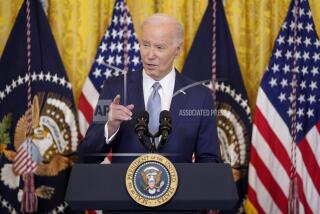Supreme Court temporarily blocks the end of Trump-era immigration policy

WASHINGTON — Acting on an emergency appeal from some Republican-led states, Chief Justice John G. Roberts Jr. issued a temporary order Monday that will preserve — for now — a Trump-era policy that turned away most migrants seeking asylum at the southern border.
The chief justice asked for a response from the Biden administration by the end of the day Tuesday.
It remains unclear whether Roberts or the full Supreme Court will make a decision on the appeal before Wednesday, when the so-called Title 42 rule is set to end.
Tens of thousands of migrants have been moving toward the border with Mexico, believing the rule would expire this week.
The Trump administration adopted the rule in response to the COVID-19 emergency and authorized the government to turn away migrants without giving them an asylum hearing. Title 42 refers to part of a U.S. public health law that allows the government to act during certain emergencies.
The Biden administration had said that as the pandemic eased, the restrictions may no longer be needed.
Last month, U.S. District Judge Emmet Sullivan in Washington set aside the rule, holding that it was no longer justified as a pandemic measure. His decision allowed for an appeal, but it was due to take effect Wednesday.
Arizona Atty. Gen. Mark Brnovich joined with 18 other states and filed an emergency appeal asking Roberts and the Supreme Court to intervene. He said the border states will see a surge of new migrants, and he argued the high court should hear the case first.
“No one reasonably disputes that the failure to grant a stay will cause a crisis of unprecedented proportions at the border,” he wrote. The Department of Homeland Security “estimates that daily illegal crossings may more than double from around 7,000/day to 15,000/day once Title 42 is terminated.”
He also argued that the Biden administration failed to vigorously defend the policy in court.
The White House had no immediate comment Monday.
Roberts said the restrictions would remain in place until the court acts.
In recent months, the Supreme Court has issued similar temporary administrative orders to give the justices a few days to hear from both sides in a case and decide what to do. In several occasions, the court has ultimately turned down an emergency appeal even after the justices put the matter on hold temporarily.
More to Read
Get the L.A. Times Politics newsletter
Deeply reported insights into legislation, politics and policy from Sacramento, Washington and beyond. In your inbox three times per week.
You may occasionally receive promotional content from the Los Angeles Times.











